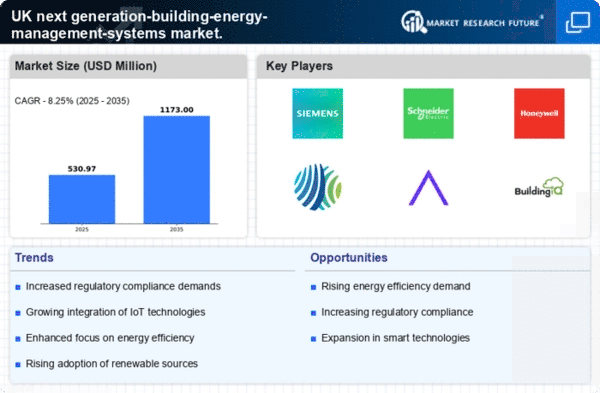The next generation-building-energy-management-systems market is currently characterized by a dynamic competitive landscape, driven by the increasing demand for energy efficiency and sustainability in building operations. Key players such as Siemens (DE), Schneider Electric (FR), and Honeywell (US) are at the forefront, each adopting distinct strategies to enhance their market positioning. Siemens (DE) emphasizes innovation through its digital solutions, focusing on integrating IoT technologies to optimize energy management. Schneider Electric (FR) is heavily investing in partnerships and acquisitions to expand its portfolio, particularly in smart building technologies. Honeywell (US) is leveraging its extensive experience in automation and control systems to enhance its offerings, thereby solidifying its competitive edge. Collectively, these strategies contribute to a competitive environment that is increasingly focused on technological advancement and sustainability.
In terms of business tactics, companies are localizing manufacturing and optimizing supply chains to enhance operational efficiency. The market structure appears moderately fragmented, with several players vying for market share while also collaborating on various initiatives. This fragmentation allows for a diverse range of solutions, catering to different customer needs and preferences, while the influence of key players remains significant in shaping market trends.
In October 2025, Siemens (DE) announced a strategic partnership with a leading UK-based energy provider to develop advanced energy management solutions tailored for commercial buildings. This collaboration is expected to enhance Siemens' capabilities in delivering integrated energy solutions, thereby positioning the company as a leader in the market. The strategic importance of this partnership lies in its potential to leverage local expertise and resources, facilitating a more responsive approach to customer needs.
In September 2025, Schneider Electric (FR) launched a new suite of software solutions aimed at optimizing energy consumption in large facilities. This initiative reflects the company's commitment to digital transformation and sustainability, as it seeks to provide clients with actionable insights to reduce energy costs. The launch is significant as it aligns with the growing trend of data-driven decision-making in energy management, potentially enhancing Schneider's competitive position.
In August 2025, Honeywell (US) unveiled a new AI-driven platform designed to enhance predictive maintenance in building systems. This innovation is crucial as it not only improves operational efficiency but also reduces downtime, thereby offering substantial cost savings to clients. The introduction of this platform underscores Honeywell's focus on integrating advanced technologies into its offerings, which may further differentiate it from competitors.
As of November 2025, the competitive trends in the market are increasingly defined by digitalization, sustainability, and the integration of AI technologies. Strategic alliances are playing a pivotal role in shaping the landscape, enabling companies to pool resources and expertise to drive innovation. Looking ahead, competitive differentiation is likely to evolve from traditional price-based competition to a focus on technological innovation, reliability in supply chains, and the ability to deliver sustainable solutions. This shift suggests that companies that prioritize these aspects will be better positioned to thrive in the evolving market.

















Leave a Comment